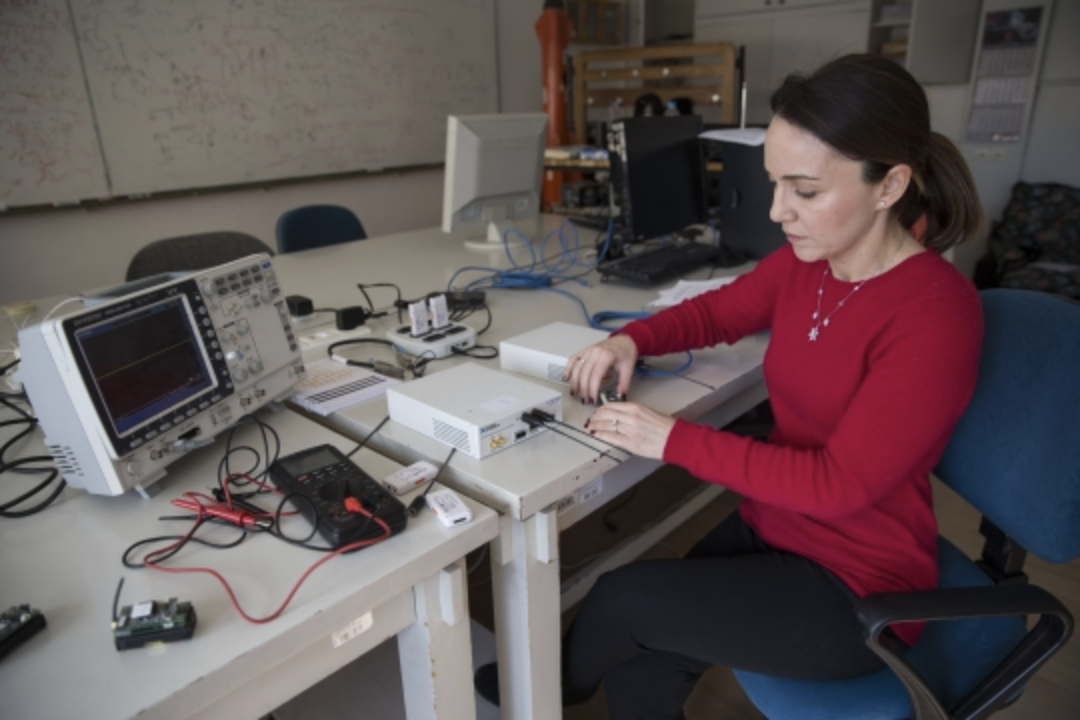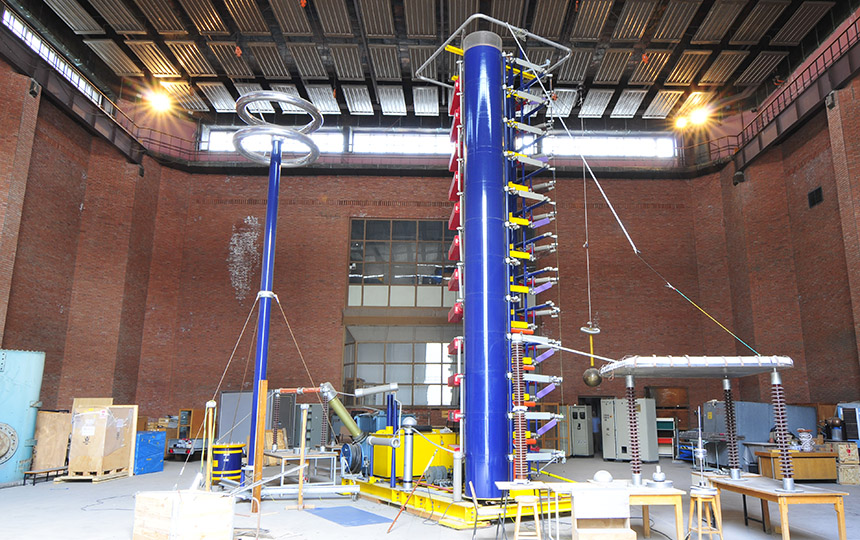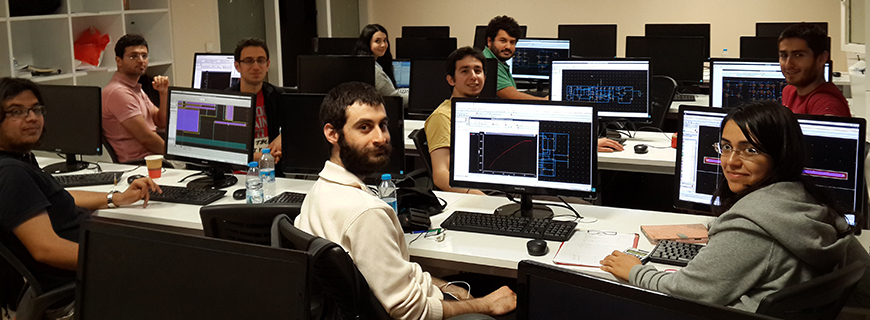
The Electrical and Electronic Engineering Department has 26 laboratories available for training and research:
1. Basic Electrical Engineering Laboratory:
This laboratory is intended to familiarize students with the fundamental procedures of electrical laboratory measurements. Experiments are designed to illustrate basic electrical circuit theory concepts for linear and non-linear resistive circuits, simple dynamic circuits, and single-phase linear AC circuits.
2. Basic Electronics Laboratory:
This laboratory is used for undergraduate electronics, logic design and telecommunications experiments. The laboratory houses state of the art test and measurement setups each including a power supply, a multimeter, a signal generator, a mixed signal oscilloscope and a personal computer. The laboratory is also equipped with the necessary hardware and software for experimenting on field programmable gate arrays.
3. Electrical Machines and Power Electronics Laboratory:
The laboratory is sufficiently equipped with instrumentation and experimental setups to support undergraduate and graduate curricula on all types of rotating machinery up to 10 kW. Additionally, facilities are available for research on drive systems, which allow dynamic torque measurement, measurement of power for distorted waveforms etc.
4. Microcomputer Systems Laboratory:
This laboratory primarily aims to acquaint the students with the basics of microprocessors and microcontrollers and their relevant interfacing techniques. It is designed for conducting experiments on microcomputer systems and microprocessor/controller based applications in both hardware and software, using mainly machine language and assembly level programming. The laboratory is equipped with development boards and training kits of various microprocessor families such as Motorola and Intel, and personal computers, networking facilities, high level programming tools and other necessary support equipment.
5. Computer Architecture Laboratory:
This laboratory is designed to teach computer architecture fundamentals to students and is equipped to make them conduct various experiments on computer hardware organization using suitable training kits, microprocessor development boards and necessary support equipment.
6. Computer Systems and Networking Research Laboratory:
This laboratory is mainly for graduate research and training and is equipped with PCs, workstations, logic analyzers, various advanced level computer development platforms, DSP boards, networking simulation software, etc. The research topics are concentrated primarily on computer systems and architecture, computer networking, routing problems, QoS issues, performance modeling, network optimization and fault tolerance.
7. Computer Vision and Intelligent Systems Research Laboratory:
This laboratory is designed for graduate and post graduate students studying in the fields of computer vision, pattern recognition, intelligent systems and robotics. It is equipped with computers for researchers, a parallel processing system, a robot base and special instrumentation, which can be used in robot construction.
8. Multimedia Research Laboratory:
This laboratory is designed for both graduate and senior students. Currently, the reach is concentrated on video transmission, watermarking, data hiding, image/video indexing, 3DTV, and object tracking. Several national and international projects on these topics are being pursued in the laboratory. The laboratory is equipped with high performance computers; several DSP boards; stereo, video, still and depth cameras, autostereoscopic displays.
9. Robotics Research Laboratories:
Robotics Laboratory and Robot Hand Laboratory serve as a platform for conducting experimental studies to support the robotics related courses offered in the graduate program. Available hardware includes one robot arm (PUMA 700 series), a robot hand, a simple educational purpose robot arm, and a programmable mobile robot. Research studies conducted in the same laboratories are mainly concentrated on vision and image understanding (stereo vision, motion vision, model-based vision, image/video transmission and analysis), planning (motion planning and task planning applications on both mobile robots and robot arms), reasoning, machine learning, AI, and navigation.
10. Process Control Laboratory:
The laboratory provides facilities for undergraduate and graduate training and research in the field of control and instrumentation of industrial processes.
11. Laboratory of Feedback Control Systems:
The laboratory contains various linear and nonlinear electromechanical systems that are monitored and actuated via computer. The feedback laws to control these systems are designed and implemented through Matlab/Simulink
12. Telecommunication Research Laboratory:
This laboratory provides facilities for undergraduate and graduate studies in the fields of telecommunication and signal processing. The laboratory is equipped with special purpose telecommunication instruments as well as basic signal generation and analysis facilities.

13. Antenna Laboratory:
The antenna laboratory is well-equipped for making measurements of antenna parameters such as gain, pattern, polarization, input VSWR, and impedance at frequencies ranging from 1 to 40 GHz using an anechoic chamber of dimensions 6.73mx2.85mx2.60m. The laboratory is equipped with electromagnetic simulation and circuit design software.
14. Microwave Laboratory:
It is equipped for studies in the frequency range of 0.1 to 40 GHz. A network analyzer and a spectrum analyzer are among the basic facilities offered in this laboratory for undergraduate training as well as graduate research. Waveguide, microstrip and stripline circuits and components are studied, including thick-film hybrid circuits and components. The laboratory is equipped with electromagnetic simulation and circuit design software.
15. Photonics Laboratory:
This laboratory is intended to familiarize students with the fundamental procedures of photonics laboratory measurements. Experiments are designed to emphasize engineering applications.
16. Power System Laboratory:
The laboratory is designed for undergraduate and postgraduate teaching and research.
17. High Voltage Laboratory:
This laboratory provides facilities for undergraduate and graduate experiments and research as well as quality control tests of high voltage insulation for industrial equipments. The laboratory consists of medium and high voltage test halls and is equipped with high voltage, A.C., D.C. and impulse test systems, high voltage and current measurement, waveform recording, and discharge detection facilities.

18. Static Power Conversion Laboratory:
This laboratory has necessary facilities to carry out experiments on SCR based rectifier/inverter sets for the study of static power conversion and conducting research in the field. It offers a suitable ground for developing high power DC sources and electrical drives. It is furnished with the necessary equipment for harmonic studies related to static power converters.
19. MEMS and Microelectronics Fabrication Laboratory:
This clean room houses the necessary equipment for the fabrication of Micro-Electro-Mechanical Systems (MEMS), microelectronics, and optoelectronic solid state devices and circuits. Laboratory facilities include a high resolution lithography system and photoresist spinner, a sputtering system, thermal evaporators, diffusion and oxidation furnaces, a plasma etcher, a surface profiler, chemical hoods, and ovens. Researchers in the laboratory have also access to cleanroom facilities of METU-MEMS Research and Applications Center, which has 1300m2 cleanroom with 4”, 6”, and 8” wafer processing capability with 0.35µm lithography resolution.
20. VLSI and MEMS Design Laboratory:
The educational part of the laboratory can accommodate 25 concurrent users with 25 state of the art Linux workstations that can run a number of engineering design software mainly geared towards integrated circuit design, VLSI, and MEMS. The software packages available in the lab include 100 seats of full Cadence suite for integrated circuit design education, in addition to 15 licenses for research purposes in another laboratory. Moreover, the students in both laboratories can access many engineering tools such as HFSS for electromagnetic analysis, CoventorWare and ANSYS for FEM analysis and Matlab and Mathemetica for mathematical modeling and analysis, as well as other VLSI CAD design tools like Tanner Tools and Synopsys.

VLSI Laboratory, Integrated Circuit Design Project Study, May 2015
21. Quantum Devices and Nanophotonics Research Laboratory:
This research laboratory houses two certified clean rooms for the growth, fabrication and characterization of compound semiconductor devices. The facilities include two molecular beam epitaxy (MBE) reactors for the epitaxial growth of III-V and II-VI compound semiconductors, high capacity liquid nitrogen production system, semiconductor characterization equipment including an XRD system, lithography system, thin film coating systems, reactive ion etcher, two flip-chip aligner/bonders for the hybrid integration of optoelectronic components, high resolution lapping/polishing system and wire bonder. The laboratory also houses the necessary equipment for the electrical and optical characterization of semiconductor devices and infrared sensor arrays. The current research activities in this laboratory are concentrated on large format single and multi band infrared sensor arrays for thermal imaging applications.
22. Biomedical Engineering Training Laboratory:
This laboratory houses experimental set-ups to study various types of sensors and measurement techniques, biopotential amplifiers, a nerve stimulator, a PC-based ECG system, a spirometer and variety of electronic test equipment. The laboratory has been established as a reference biomedical engineering training laboratory in Turkey.
23. Medical Instrumentation and Physiological Measurement Laboratory:
This laboratory is equipped with multipurpose transducers, amplifiers for ECG, EEG, EMG, and phonocardiogram, a nerve stimulator, an animal respirator, infusion pumps and surgery tools for graduate research. In this laboratory, animal experiments can be performed on a range of animals from rat to sheep.
24. Medical Imaging Laboratory:
Current research in this laboratory is mainly focused on developing numerical methods and hardware for a novel medical imaging method that uses electromagnetic means to image tissue electrical conductivity distribution. For computational and visualization purposes, workstations and desktop computers are employed with necessary compilers and a professional visualization software.
25. Magnetic Resonance Imaging Laboratory:
This laboratory has a 0.15 Tesla, 800mm clear bore whole body Oxford resistive magnet, Analogic Corporation gradient and RF amplifiers. This laboratory is also equipped with hardware and software tools for MR-current density imaging, MR-Electrical Impedance Tomography.
26. Brain Research Laboratory:
The research in this laboratory is on the Electro-magnetic-Source Imaging (EMSI) of the human brain. Currently, the forward and inverse problems of EMSI are studied, and a 256-channel EEG device is being developed.
Other Facilities:
Student Computer Service Room is designed for the use of undergraduate students. Various compilers, word processors, graphics editors and special mathematical and electrical application programs are available for users.
Departmental machine shop is equipped to manufacture various parts required for research projects and laboratories. Facilities are available for turning, milling, drilling, punching and welding. A surface-grinding machine is also available for precision machining.
